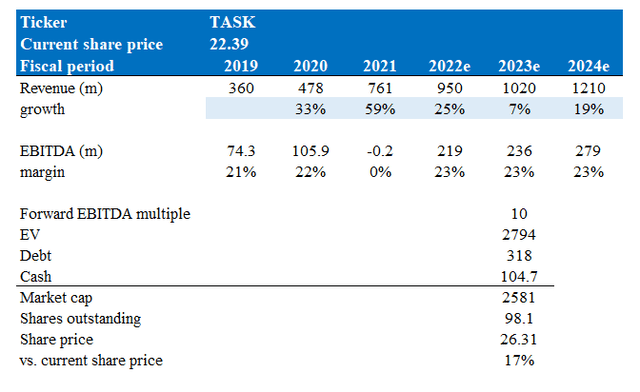da-kuk
Investment thesis
I believe TaskUS (NASDAQ:TASK) is undervalued. With its cutting-edge technological infrastructure, TASK has emerged as the market leader in riding the wave of secular trends in technology and AI demands. As a multinational digital outsourcer targeting high-growth technology companies, TASK offers and curates unique product offerings and delivery models. This enables the company to have a stronger potential to explore global opportunities. Despite the presence of risks to brand image, emerging markets, and complex operations, TASK is currently trading at 10x forward EBITDA, and I expect revenue to continue growing at a high pace.
Business overview
TaskUs is a digital outsourcer that specializes in representing, protecting, and growing the brands of high-growth technology companies. TASK assists its clients in meeting the urgent needs of their end customers, navigating an increasingly complex compliance landscape, and handling sensitive tasks such as online content moderation.
Secular trends support industry long-term growth
I believe that several developments have benefited TASK customers and increased their demand for TaskUs solutions, as technology and the internet have fundamentally influenced the way consumers seek to engage with their favorite brands.
The Internet of Things [IOT], cloud computing, mobile web services, and artificial intelligence [AI] are all examples of cutting-edge digital innovations that are reshaping the business landscape and opening up new avenues for economic expansion. Its success has been evident as the number of initial public offerings and venture capital/private equity investments in the tech industry increased over the previous decade. These businesses have grown rapidly by leveraging technological advancements and lowering the barriers to entry in their respective industries. In some cases, the expansion has been boosted even further by COVID-19.
As tech businesses expand, they need to invest in both product development and back-end infrastructure. However, while companies focus on expanding their core offerings, they often lack the resources and motivation to build out their operational infrastructure. So, TASK believes tech firms are generating massive development in the outsourcing sector by being more open to outsourcing at earlier stages of their projects’ life cycles. Many technology firms have adjusted to COVID-19 by allowing workers to do some or all of their work from home. This, according to TASK, has made workers more at ease in a less regimented work setting and led to more options for outsourcing.
In addition, I agree with TASK that it’s becoming less essential where people are physically based, whether they’re employed directly or by an outsourced partner, as organizations are compelled to learn how to work remotely.
Finally, TASK anticipates more outsourcing opportunities as AI develops. AI use cases are rapidly expanding, and the success of AI companies will depend heavily on the accuracy of their algorithms, which is directly linked to the quality of underlying data sets that must be manually annotated by qualified specialists.
Unique product offering catered for high-growth companies
With the advent of smartphones, consumers’ behavior has shifted dramatically over the past decade, and TASK’s Digital Customer Experience services cater to their changing needs. It’s easy to forget that the pocket luxuries people enjoy today—whether it’s an app used to have food delivered promptly, buy and sell stocks safely, or stream their favorite shows—were either in their infancy or nonexistent 10 years ago. Every one of these sectors is an example of an emerging industry that has become a key growth engine for TaskUs. TaskUs has helped Zoom (ZM), Netflix (NFLX), Uber (UBER), Coinbase (COIN), Oscar, and a lot of other fast-growing companies with their logistics needs.
Concerns about censorship, community moderation, and foreign intervention in democratic election processes have risen to the forefront because of the rapid rise of user-generated content and social media. Content monitoring and moderation services, like those offered by TaskUs Content Security, are becoming increasingly important in the fight to preserve the integrity of the open internet. Additionally, as the prevalence of AI continues to rise at a rapid pace, TaskUs AI Operations offers its clients high-quality, human-annotated data sets and algorithm training.
As we can see, TASK has a history of successfully spotting promising new markets when they’re still in their infancy, securing high-profile customers, and establishing industry standards for everything from thought leadership to business operations thanks to its thesis-led prospecting techniques. In addition to solidifying TASK’s market leadership, its early-mover status and clients’ willingness to serve as references have resulted in a snowball effect in gaining new TaskUs clients.
The fact that TASK can carefully target high-potential clients who have never outsourced before is a testament to the efficacy of its agile and responsive operational strategy. Since 2017, more than 50 TaskUs clients have used the company as their first outsourcer in its service areas. They do this because they know TASK is the only company that can help clients grow from a small business to a global enterprise.
Delivery model curated to fit high-growth companies
I must say that TASK has a delivery model that’s perfect for high-growth businesses. Clients can outsource many of their essential procedures in the early phases of their company’s life cycle thanks to TaskUs’s cloud-based technological infrastructure, which is designed to enable clients to set up operations fast and seamlessly. To achieve technologically driven efficiency benefits,
- TASK places a premium on data science and automation of procedures,
- TASK constantly analyzes massive volumes of data collected from customer interactions for its clients, and
- TASK makes use of this information and the feedback of its end users to improve workflow, inform its clients on the kinds of actions they can take to reduce customer churn, and come up with ideas for new features to add to their products.
Digitally native
TASK has been around for over a decade, and thanks to being “born on the web and grew up in the cloud,” the company can break into the market without having to invest in legacy infrastructure. TaskUs is proficient at carrying out tasks across several digital channels, including chat, native in-app messaging, SMS, and social media. In fact, TASK’s cloud-based technological architecture allows the company to derive the majority of its revenue from non-voice, digital channels, or omnichannel services in 2020.
What’s most important, TASK is able to provide its services and solutions to its customers because of its cutting-edge, adaptable, scalable, secure, and dependable technological infrastructure. TASK uses what it considers to be best-in-class hardware and software components to support and fuel its rapid expansion. The company’s products make use of virtual desktop architecture, which allows for safe, anywhere-accessible productivity and efficiency. TaskUs continuously analyze new technologies to cut costs, keep systems secure, and enhance offerings. To keep its business running well, TASK is constantly updating its software, hardware, and network to increase efficiency, flexibility, and transparency across the company and for its clients.
Potential to explore global opportunities
I think TASK’s international clients and audience would greatly benefit from the company’s global reach and linguistic flexibility. For example, a request from an online gaming client brought TASK to Taiwan, and TASK also supported the debut of a European market in Greece. The expansion into new markets provides the company with an opportunity to broaden its customer base by providing services in multiple languages and expanding its range of products and services. To fuel growth among both current and prospective clients, TASK intends to continue broadening its geographic footprint.
Valuation
Based on current consensus estimates, I believe the upside from here is decent. My model suggests a 1-year return of 17% from the current share price. In the short term (FY22), management expects revenue of $950 million. Notably, management raised guidance for FY22 after 3 quarters, which gives me confidence that TASK is able to hit its FY22 guidance. TASK is currently trading at 10x forward EBITDA, and I assumed it would trade at the same valuation in FY23. However, any upside rerating would be additional upside for investors.
Model walkthrough:
- Revenue is expected to continue growing at a high pace as TASK captures market share, from $950 million in FY22 to $1210 million in FY25. That said, I expect a slight dip in growth in FY23 given the weak macroenvironment
- EBITDA margin to revert to 200 bps above FY19 levels (2020 was an outlier)
- TASK to trade at a forward EBITDA of 10x. This is where it is trading today, after getting re-rated downward by six multiple turns since the start of the year. While I believe this is unjustified, I do not have a strong conviction that it could trade back to 16x forward EBITDA.
Risks
Reputation is important
Clients’ and potential clients’ decisions to work with TASK are heavily influenced by the company’s standing in the marketplace. In my opinion, the TaskUs brand and reputation are valuable corporate assets that aid in differentiating the company’s offerings from its rivals’ and in attracting and retaining top talents. If the company’s reputation were harmed, it would lower the value and effectiveness of the TaskUs brand name and investor confidence in the company.
Exposure to emerging markets
TASK operates extensively in the Philippines and other emerging market nations like India. Compared to more developed economies, I think emerging countries are more susceptible to market and economic volatility, which could have negative consequences for TASK’s operations and business. TASK has many employees and facilities in emerging markets and other low-wage regions. As a result, the company is vulnerable to fluctuations in foreign currency markets.
Intangible risks
This is a risk that I feel needs to be highlighted, despite the unknown impact on the financials. A significant percentage of TASK’s work involves content moderation. We don’t know what effect, if any, this task will have on the long-term mental health and well-being of the company’s employees. Working in this capacity raises risks of stress disorders and, by extension, legal problems for the business. The press and government officials pay a lot of attention to this kind of operation. This could lead to TASK receiving unfavorable coverage in the media or facing legal action, both of which could harm the company’s image and business.
Conclusion
To conclude, I believe TASK are undervalued. As previously stated, TASK has established a ground-breaking technological foundation that will enable it to become the market leader in the ever-increasing demand for data science and AI. We can say that TASK with its multinational digital solutions, is in a favorable position to pursue opportunities on a worldwide scale. TASK is trading at 10x projected EBITDA, and revenue is forecast to continue rising at a rapid rate, even though there are risks related to reputation, emerging regions, and complex operations. This is a good opportunity for investors to take advantage of the upside and high pace of growth of the company.



Be the first to comment